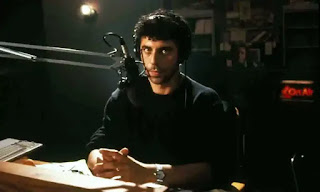Eric Bogosion as Barry Champlain: Talk Radio (1988).
This week one of Mike Hosking’s featured guests was the American actor and writer Eric Bogosian.
I have long been a fan of Bogosian. His most recent appearance on the entertainment media was his masterly performance as the ruthless and eventually jailed US senator Gil Eavis in HBO’s hugely successful Succession series. Eavis, though fictional, is believed to be based on Senator Bernie Sanders, though, of course, Sanders has never been imprisoned as far as I am aware, anyway.
It is not the first time that Bogosian has
played a character based on reality. I first came across him in 1988 when he
and Director Oliver Stone converted Bogosian’s stage play, Talk Radio, into a
film of the same name.
On stage and in the film, Bogosian plays a late-night talk show host called
Barry Champlain. Most of the story involves Bogosian/Champlain sitting alone in
the studio, with his producer next door, taking calls from an increasingly
strident, delusional, and sometimes potentially dangerous gamut of callers who
want to cover everything from home recipes to hate crimes. There is on
Champlain's show a recurring thread—and threat—of anti-Semitism.
Gradually, over the course of the show, Bogosian/Champlain cracks under strain. It’s a disciplined and highly captivating performance by Bogosian in the movie, especially considering there are only a few other characters—other than call-in voices—in the movie and none in the one-man stage version.
Champlain is a deeply polarising character
whose listeners either love or hate him. But none can do without him.
It is ironic that Bogosian appears with Mike Hosking, a host who has a similar
polarising effect in New Zealand—but there, the similarity ends.
Thankfully.
As I said, Champlain is based on an actual character and event. Alan Berg was a late-night talk show host working for KAO in Denver, Colorado. He had an acerbic style that was loved by some for its entertainment value and hated by others, particularly by white supremacists (Berg was a Jew), who perceived him to be a threat.
At 9:30 p.m. on June 18, 1984, after a shift on air and a quick supper with a former girlfriend, Berg (50) returned to his townhouse. He stepped out of his car, and gunfire erupted, with Berg being shot twelve times. He died at the scene.
Nobody was found guilty of the crime, and certainly, no one was jailed for it. But it is widely believed that at least one of those white supremacist groups was responsible for it.
Nothing of that nature has happened in New Zealand, and nor is it likely—it is not in our nature.
But it is a salutary lesson that words can hurt our country—and polarising words most of all—words that wound. There is a line in Talk Radio that says, “Sticks and stones can break your bones, but words cause permanent damage!”
I hope that permanency is not the case, but in my view, there are too many of those such words around now. They are in our pubs, at our dinner parties, profligate on radio and television.
We don’t need them.
We need light relief… next week, Fryday brings back Whetu.


3 comments:
Fascinating thing for me is “why?” Why have we all become political warriors? It’s happening the world over. We used to have a discussion here and there and then ended it with a bit of a joke, right wing, left wing we used to all get on with each other to a point. Now it seems we’re at war with everyone. People blame Trump and he certain,y didn’t help. But the basis was already there.
Well said Mike and Janine.
All the "ins" come to mind, Janine.: inherent, innate, inherited, ingrained and insane.
Post a Comment